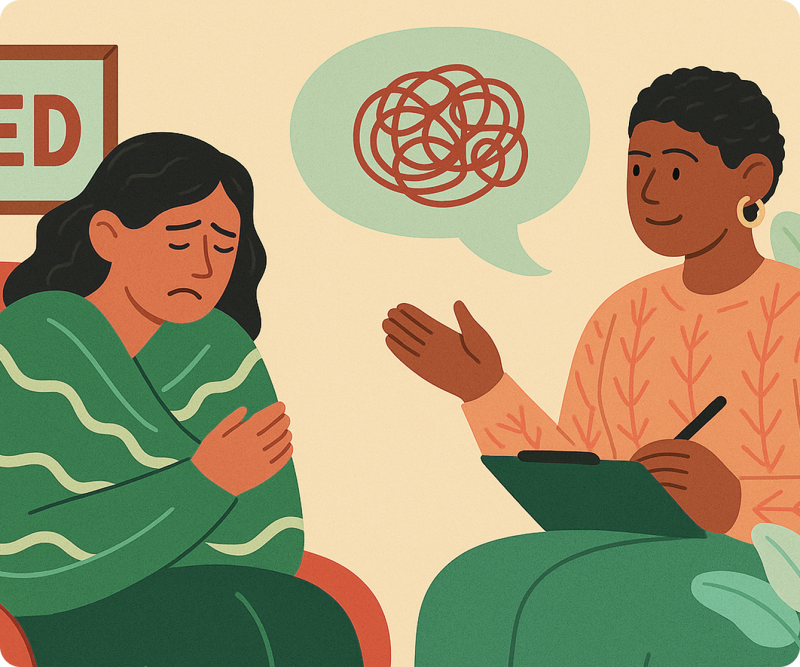
Trauma
Trauma is deeply personal. It can stem from a single overwhelming event or repeated harm over time. For some, it begins in childhood through experiences of neglect, abuse or emotional absence. For others, it may follow sexual assault, family violence, sudden loss, or moments when life felt out of control. What’s traumatic for one person may not be for another — and all trauma experiences are valid.
How we can help you
At Seed Psychology, we provide compassionate, evidence-based support for a wide range of trauma concerns. Our experienced and diverse team of over 20 Psychologists are here to help you make sense of what you’re going through and take meaningful steps forward.
If you’re unsure what best describes your experience, that’s okay. Many clients begin therapy without a diagnosis or a clear label for how they’re feeling. Our Psychologists will work with you to explore what’s going on and how best to support you.

How we can help
Our team of Psychologists draws on a range of evidence-based therapies to support emotional wellbeing, including Cognitive Behaviour Therapy (CBT), Acceptance and Commitment Therapy (ACT), Schema Therapy, Dialectical Behaviour Therapy (DBT), and mindfulness-based approaches.
We take time to understand your experience in context — including your personal history, environment, relationships, and identity — and tailor support that feels relevant and achievable.
Our goal is to help you build insight, strengthen resilience, and develop practical strategies for managing difficult emotions and improving your quality of life.
Ready to take the
next step?
We offer in-person appointments at our Brunswick practice and secure online therapy across Australia.
Freqeuently asked questions
-
Therapy is a shared process. While your Psychologist brings expertise, insight, and support, the most meaningful outcomes often come when you’re actively engaged in your own growth. This means being open and honest during sessions, reflecting between appointments, and being willing to try new approaches-even when it feels challenging. Therapy can take time, and progress isn’t always linear, but your commitment matters. Here are some ways to support your journey:
- Be open and honest with your Psychologist, even (and especially) if something feels hard to say.
- Give feedback if something doesn’t feel right or if your needs change.
- Stay open to exploring new ideas and practices within a safe, supportive space.
- Take notes or keep a journal to reflect on insights or patterns between sessions.
- Try to attend regularly-consistency is key to building momentum.
- Be kind to yourself. Growth can be uncomfortable at times, but that doesn’t mean you’re doing it wrong.
- Invest in your wellbeing outside of therapy by building habits and routines that nourish you.
Therapy is a courageous act of self-investment. By showing up and staying engaged, you create space for real and lasting change.
-
Therapy is a process of growth and change. While every person’s journey is unique, it often unfolds across four broad stages:
- Understanding You: Exploring Challenges and Goals
In the early sessions, your Psychologist will focus on getting to know you—your concerns, your experiences, and what matters most to you. Together, you’ll identify the challenges you’re facing and begin shaping the goals you’d like to work toward. This stage is all about building trust and creating a safe, supportive space.
- Planning the Path Forward
Once your Psychologist has a clear understanding of your needs, they’ll work with you to create a realistic and collaborative treatment plan. This includes identifying the most helpful approaches and an initial timeframe. Some goals can be addressed in the short term, while others may take more time than a standard referral allows. Your Psychologist will always talk this through with you, so you can make informed choices about your care.
- Working Together: Intervention and Progress
This is the active phase of therapy. You’ll begin to explore new perspectives, learn practical skills, and work through patterns in your thinking, emotions, and behaviour. Progress isn’t always linear—there may be ups and downs—but your Psychologist will regularly check in on how things are going and adjust the approach as needed.
- Completion and Ongoing Support
When you and your Psychologist feel that your goals have been met and your wellbeing has improved, you’ll begin planning for the final stage. This might involve reviewing your progress, identifying strategies for staying well, and developing a plan for life beyond therapy. Some clients return for occasional ‘booster’ sessions, while others choose to reconnect during new seasons of life.
-
There’s no one-size-fits-all answer to how long therapy takes. At Seed Psychology, we tailor each intervention to your individual needs, goals, and circumstances. Some people come to therapy to navigate a specific challenge, like managing anxiety, adjusting to a life transition, or processing a relationship difficulty. Others may be seeking deeper emotional growth or support for longer-term concerns. Because of this, the number of sessions can vary. Many clients attend between 6 and 18 sessions, though some need fewer and others continue for longer. Your Psychologist will discuss an estimated treatment plan with you after your initial assessment and continue checking in over time to ensure it feels helpful and aligned with your goals. Ultimately, the pace and duration of therapy is something we navigate together, guided by your progress, preferences, and what feels right for you.
-
We understand that finding the right fit is important. Building a strong relationship with your psychologist can take time, but if at any point you feel the connection isn’t quite right, we’ll support you in transferring to someone new. Your well-being is always our priority.
-
At Seed Psychology, your safety and wellbeing are our highest priorities. While we are here to support you through regular therapy sessions, we are not a crisis service and may not be available outside of scheduled appointments. If you or someone you care about is in immediate danger, experiencing a mental health crisis, or needs urgent support, it’s important to seek help straight away through the appropriate emergency or crisis services. You can find a list of trusted organisations and services here that can provide immediate support when you need it most.







